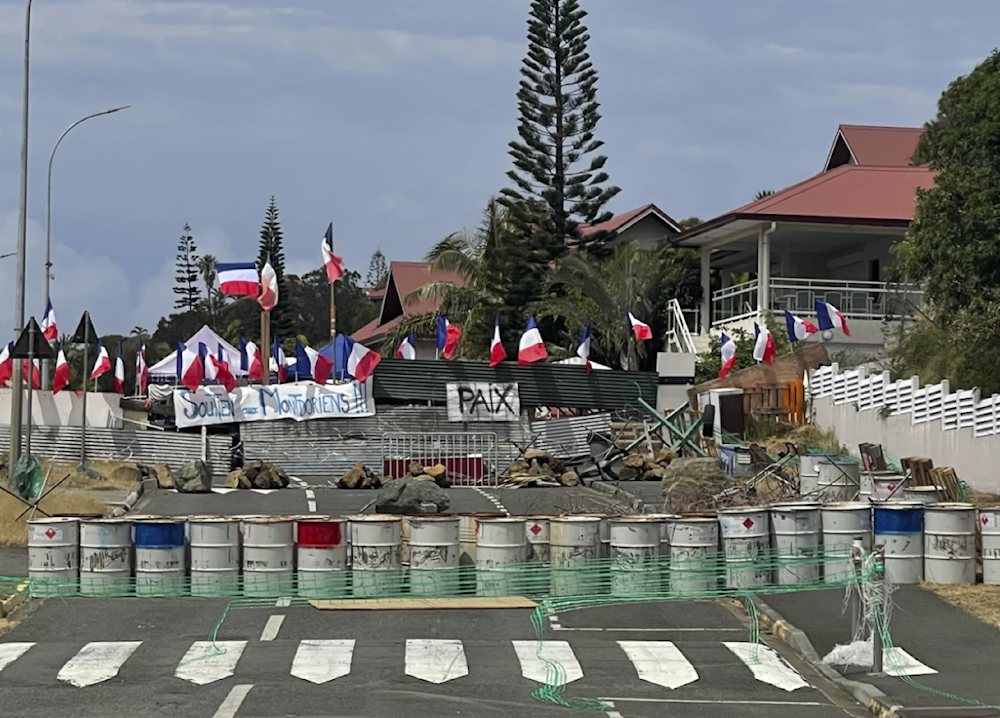Kanak senator says independence ‘only solution’ for New Caledonia
New Caledonia Senator Robert Wienie Xowie stated, “After what we've seen and experienced in recent months, there is no other solution for the country today than lasting peace; and that is called 'sovereignty.'"
-

A pro-loyalist barricade with French flags is photographed during the 171st anniversary of France's takeover of the Pacific Archipelago in Noumea, New Caledonia, French Pacific Islands on September 24, 2024. (AP)
A Kanak pro-independence senator from New Caledonia, a French colony in the Indo-Pacific area, stated that the island's only solution is to gain independence in light of recent regional developments.
Speaking with Anadolu, New Caledonia Senator Robert Wienie Xowie stated that the Paris government's attempt to enact a reform measure aimed at modifying voter registration caused the present crisis on the island.
The senator stated that the French government should reengage in conversation with pro-independence advocates and rebuild confidence by dropping the reform bill.
Addressing the new government's influence on New Caledonia, Xowie stated, "We must not be delusional. There is a new government, that's true. And when we consider how slowly and long it took for this government to be established, we understand that it will always be guided by the Élysée (the French Presidency)."
Xowie pointed out that the Noumea Accord, signed by France in 1998, laid the framework for New Caledonia's independence.
“After what we've seen and experienced in recent months, there is no other solution for the country today than lasting peace; and that is called 'sovereignty.' 'There is no other way, " he declared.
Xowie also expressed regret that New Caledonian pro-independence activists are being held in France, 17,000 kilometers (10,563 miles) away from their motherland.
He blasted France for failing to reconsider and reflect on the fact that "We reacted because there is a desire to separate them from their family ties," adding, "Because in a country that upholds human rights, we cannot continue to turn a blind eye to people losing their dignity and especially their rights."
A flashback
New Caledonia, with a population of about 270,000, was rocked by unrest in mid-May, sparked by French plans to impose new rules that would give tens of thousands of non-indigenous residents voting rights.
France deployed thousands of troops and police to the archipelago, located nearly 17,000 kilometers (10,600 miles) from Paris. The violence resulted in hundreds of injuries and an estimated material damage of around 2.2 billion euros ($2.4 billion).
In mid-September, security forces shot and killed two men during an overnight operation, according to the public prosecutor on Thursday, bringing the death toll to 13 following months of unrest in the islands.
The electoral changes, which require amending the French constitution, have been effectively stalled since President Emmanuel Macron dissolved parliament for new elections. The July elections resulted in a lower house without a clear majority.
While unrest in the territory has decreased since mid-July, the road to Saint-Louis on Grande Terre remains closed. For the village's 1,200 residents, the only access is by foot after presenting ID at checkpoints. Only emergency services and ambulances are allowed entry otherwise.
Although most roadblocks across New Caledonia have been removed, a curfew from 10 pm to 5 am remains in effect. Since June 19, 13 pro-independence activists have been arrested, with seven currently imprisoned, including five in mainland France.

 3 Min Read
3 Min Read








